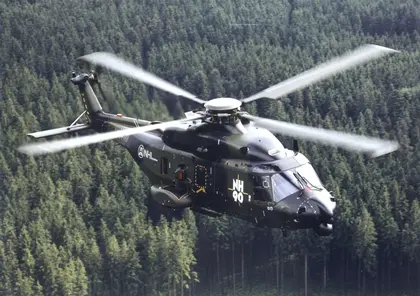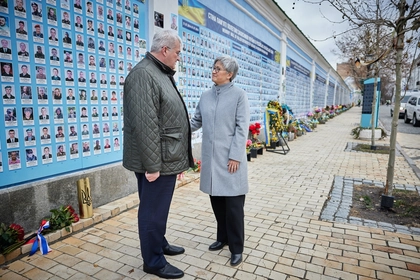The idea of transferring Australia’s retired fleet of MRH-90 helicopters to Ukraine has been suggested by several parties since the government decided upon early retirement. Yet the most recently reported development in the MRH-90 saga is that the ADF plans to dismantle and bury these aircraft rather than donate them to Ukraine.
There are compelling reasons why donating the MRH-90 fleet to Ukraine makes much more sense than scrapping them.
JOIN US ON TELEGRAM
Follow our coverage of the war on the @Kyivpost_official.
Ukraine has had a chronic shortage of helicopters since Russia initiated its partial invasion in 2014, and its full-scale invasion of Ukraine almost two years ago.
The Armed Forces of Ukraine inherited more than 400 military helicopters when the USSR collapsed three decades ago, mostly Mi-8 HIP multi-purpose helicopters and Mi-24 HIND helicopter gunships. By 2014 most of these helicopters were no longer airworthy, with worn out engines, gearboxes and rotor blades, and many had been cannibalized to keep others flying. Ukraine lacked production capabilities for many spare parts and was only able to get replacement rotor blades into production shortly before the 2022 full scale invasion.
The Ukrainian helicopter fleet numbering a few dozen flyable aircraft was heavily overused from the earliest days of the 2022 full-scale invasion. During the Battle for Kyiv in the first weeks of the war, the fleet was used round the clock to strike at Russian forces besieging the capital, with many helicopters and courageous aircrew lost to Russian air defenses. The besieged Ukrainian garrison at Mariupol was resupplied for weeks by helicopters that flew in under Russian air defenses. But that heroic operation ceased after the Russians blocked access and shot down a flight killing the crew and wounded troops that were being evacuated.

ISW Russian Offensive Campaign Assessment, December, 20, 2024
NATO allies, including the US, donated what remaining Soviet and Russian helicopters they had to partially compensate for Ukraine's losses. The fleet now comprises a proverbial “zoo” of no less than sixteen variants of the two main helicopter types.
As the HIND gunships are scarce, many of the HIP transports have been modified to fire Western supplied Hydra and Zuni air to surface rockets. But modifying leftover transport helicopters into gunships cannot not solve the more basic headache of a worn-out, understrength, shrinking, and largely obsolete fleet of military helicopters.
Ukraine needs modern Western helicopters, both quickly, and in large numbers.
Why the Australian government did not pre-emptively offer the MRH-90 helicopters to Ukraine when the decision was made on early retirement remains an unanswered question. Agreeing to the ADF plan to scrap and bury assets for which taxpayers had spent over $3 billion dollars, and which have years of remaining life in them, qualifies as bizarre.
No doubt the defense ministry can dredge up any number of irrelevant “explanations”, as we have seen with their ongoing media campaign which seems designed to discourage Ukraine from asking for the forty plus mothballed RAAF F/A-18 Super Hornet multirole fighter aircraft.
Donating the MRH-90 fleet, remaining spare parts, documentation and support equipment does not incur any future financial or support obligations for Australia. Variants of the NH-90 series are operated by nine European allies of Ukraine all of whom have been generous donors of military equipment and training.
Ukraine already operates the Airbus Super Puma and has established supply chains in Europe. So, the supply chain and maintenance woes that bedeviled the ADF while operating the MRH-90 simply do not apply to Ukraine – Ukraine's European allies can solve these problems.
No differently, airlifting the MRH-90 fleet to Europe is also a task Ukraine's other allies can handle should the defense department decide that it is too expensive or inconvenient.
Donating the remaining MRH-90s to Ukraine would offer a strategic payoff to Australia. Russia's long running campaign to destabilize Europe and the Middle East, and meddle in Western politics, directly threatens Australia's interests as a global exporter.
In the zero-sum game between Russia and the West scrapping the MRH-90s, instead of donating them to Ukraine, is in effect aiding Russia in its genocidal campaign to conquer Ukraine.
The Australian Government might want to ask some hard questions of its defense department - especially as Ukraine has requested these helicopters as aid.
The Kafkaesque episode of the disposal of the MRH-90s is one of many we have seen play out in the ADF over the last two decades and one that should have politicians and the public asking for some real explanations – not contrived excuses that make little sense.
The bottom line is that donating the MRH-90 fleet to Ukraine is cheap and yields good strategic and political payoffs with no baggage for the Government or the taxpayer.
The views expressed in this opinion article are the author’s and not necessarily those of Kyiv Post.
You can also highlight the text and press Ctrl + Enter






